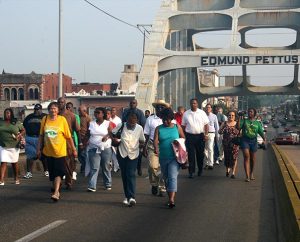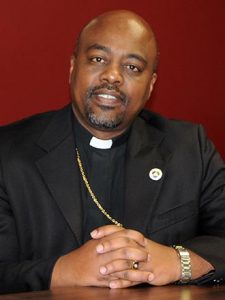By Tilahun M. Mendedo
I have had an opportunity to watch the movie “Selma.”
Some who have seen this film might quibble over historical details that may be inaccurate or inferences that fail academic scrutiny — reactions that were similar to mine. However, to get caught up in this arena would be to miss the point of the film entirely.

The movie recounts the events that led up to the marches, the horrific events of “Bloody Sunday,” the prayer march, and the final Selma-to-Montgomery march that paved the way for the passage of the Voting Rights Act later in 1965
The film did an excellent job of portraying what occurred in Selma and the surrounding areas and avoided bashing any ethnicity or group. In fact, I applaud the director and producers for showing the response of clergy from around the country to the activities in Selma, and the support from so many men and women from all ethnic origins.
I am proud in the knowledge that there were Lutheran pastors and supporters contributing to the movement and marches. But what I truly appreciate is that the film creates conversation about a sensitive topic.
As we approach the 50-year anniversary of the events that the movie covers, much has changed. Gone are the poll taxes, voting vouchers and other obstacles that prevented African-Americans from exercising their right to vote.
But while there has been change, the work is not complete. There are many accomplishments left unfinished and much dialogue needs to continue. The civil-rights struggle continues, and as a church, we need to position ourselves at the forefront of the discussion.
This is where Concordia College Alabama (CCA) can truly take the lead. As a Christian college, we know the power of Jesus Christ and the salvation we find through His death and resurrection. We are able to recognize that we are all sinners and that true freedom only comes through the faith provided us by the Holy Spirit as a gift of our Father in heaven.
Being located in the heart of the Civil Rights Movement, we at CCA are in a unique position to continue on the path set before us by so many men and women, but with an understanding of justice that is Christ-centered. In addition, we have to minister to young men and women who are still facing problems — a ministry that God brings to our doors.
In less than two months, Concordia College Alabama will be hosting its third annual Civil Rights Symposium. We will have almost 100 students from other colleges, universities and schools coming to our campus to participate in lectures, discussions, presentations, seminars, tours and panel discussions — all of which will focus on civil rights from a Christian perspective. An amazing group of speakers, lecturers and panelists are scheduled to be in Selma for the symposium, in addition to professors who will also be on campus.
Our desire is to see the next generation of young men and women become ignited with a passion for equality and improvement, and hopefully gain a better understanding of how to serve all people in the Church, community and world.

As a result of watching that moment in the movie when the crowd kneeled down for a prayer on the bridge in the middle of the march, I came to a new level of understanding of Concordia College Alabama’s vision statement: “It takes the church to continue CCA’s vision of educating the youth in the community.”
Living in the community of Selma and working at CCA helped me to realize that the higher-education market in the Black Belt of Alabama cannot be treated the same as other, more affluent places in this country. In our case, we are not running a mere business. Our work at this college is far from being a for-profit institution. It is a continuous mission work begun in 1922 by a local black missionary woman, Dr. Rosa J. Young, years before the Civil Rights Movement.
We need to follow in the footsteps of Dr. Young, who advocated service centered on educational opportunities and the Word of God being made available to all.
The movie “Selma” reminds potential donors that the mission still lives. The need still exists to support our community. CCA is a beacon of change and the hopes and dreams for progress.
We need to work on creating a civil-rights center on this campus and make it a focal point for the city. There is no better place for a civil-rights major or concentration than Selma. Prospective students would be drawn to a school that has such historic roots.
We have not done a good job of educating this current generation about the struggle and what it has meant to the world. CCA has the opportunity to do so. I believe our participation in the 50th-anniversary celebration will be a plus for us, and we should do everything possible as an HBCU (Historically Black Colleges and Universities) institution of higher education to be in the forefront of the celebration.
Knowledge awakens the consciousness of the human mind and is essential in the fight against injustice and poverty.
I hope that as a result of this movie, many will heed the call to join us in this mission at Concordia College Alabama, located in the historic city of Selma.
Finally, I pray that people watch the movie “Selma” with an open mind and a prayerful heart.
I hope viewers recognize the work that still needs to be done in the Church and in communities around the country. I pray that viewers recognize the need to keep Jesus at the center of civil-rights discussions and its effect on all people — regardless of skin color, culture or nationality.
“Selma” is a powerful movie about a community that still has tremendous needs, as the Rev. Dr. Martin Luther King’s call for clergy and those of faith still resounds throughout the country today. We all need to answer that call.
The Rev. Dr. Tilahun Mekonnen Mendedo is president of Concordia College Alabama, in Selma — one of the 10 Concordia University System institutions of The Lutheran Church—Missouri Synod.
Posted Jan. 27, 2015





Dear Rev. Dr . Tilahun,
I have read your accounts of Civil rights movement and special connections to the school which is led by you. I am glad you all also have Ethiopian roots which is easier for me to share about a group of Ethiopian Air Force Cadets who were present and witnessed the most difficult living conditions for people of color at the time. One of them was my own uncle who still lives in Debre Zeit. His is name is Tamrat Bikila (Brigadier General). They were only allowed to stay inside Air Force Academy. Today more than 50 years letter someone with Ethiopian roots is the President of school in that same State. What a change? I am so happy for you. May God bless you and your family!
Abraham Habteyesus
Rev. Mededo,
Thank you for your message, your work and your ministry. It has reopened my eyes to the work that still needs to be done. As a teen during the 60’s I only remember bits and pieces, sound bites of Selma, but the scene of kneeling for prayer on the bridge that you described, did pop back into my mind. I pray that your museum will become a reality. We must never forget.
Rev. Dan Vines
Aberdeen, WA